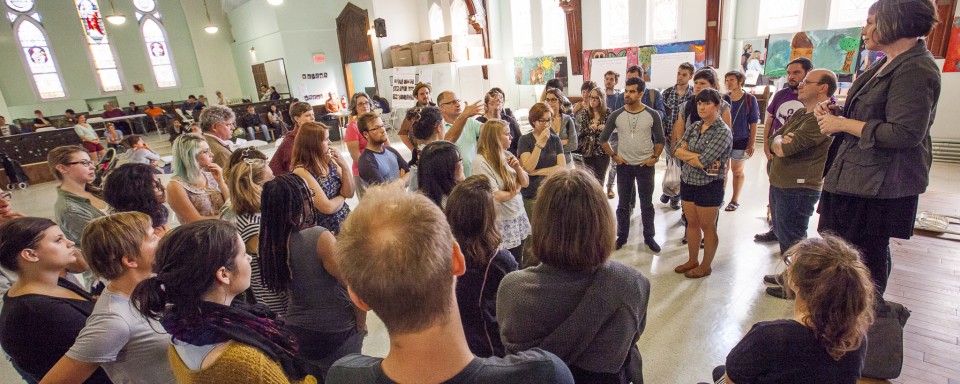By Jordana Starkman
Students of the Working Class Public History class reflected on their experiences of representing oral histories of Pointe-Saint-Charles which are part of the archive at the Centre for Oral History and Digital Storytelling.
The first time I walked around Pointe-Saint Charles, I was privileged to have Richard Stillwell as a personal guide. As we walked he not only recounted his memories of growing up and his feelings on coming home, but also entered into a more personal conversation wherein his own interests, beliefs, and experiences poured out at every corner. We removed the headphones of the audio guide as he spoke so vividly about spruce beer that I could taste the subtle woody-ness of the drink. The topic of spruce beer, told through childhood anecdotes, lasted almost 5 blocks. As Mr. Stillwell spoke, his facial expression mirrored the beautiful and far away sentiments of his past. With what I describe as “twinkly memory eyes,” he seemed to look over and beyond the landscape, as if his childhood was rematerializing around him. While at times the city around him seemed current, vividly coloured, at other times he gazed at his surroundings as one might look at an old sepia photo, with nostalgia and distance. This description, of course, is only based on what I imagined when I looked at his eyes.
It was in this experience of completing the walking tour that I was reminded of the ways in which my own ideas would colour my representation of Mr. Stillwell. Online, he has an audio interview, which does not include a transcript or video. After listening twice I noticed that while he spoke with some degree of nostalgia, his content and intonation were much more to the point. He spoke as though everything he was talking about was concrete and real; only the faintest hint of “twinkly memory eyes,” could be detected, and only if you listened hard enough. He did not dwell on memory.
Herein lay my most salient issue of representation. While I was shown one aspect of Mr. Stillwell, he chose another part of himself to show to his interviewer and the wider audience of audio-walkers. Would it be fair of me to represent the nostalgic image I saw, or would a stoic depiction be in line with what Mr. Stillwell would want? Where was it appropriate for me to draw on a private interaction and where should I should I rely on the sense I got through his interview?
While I had thought this through and planned carefully, I noticed that as speed dating started, my sense of self-consciousness evaporated and with it went most of my plans. Originally, I aimed to give rudimentary details of Mr. Stillwell’s (or at that point, my own), life including date of birth and address, followed by an overview of childhood pastimes dictated by the sense of freedom relayed in his interview. Nothing would be too personal. However, I quickly found myself switching to language Mr. Stillwell used when speaking with me. I had an overwhelming urge to personalize everything and bring my partner into my story. I did not say “I grew up on 832 Charon Street,” but “I grew up on 832 Charon Street, you’ve probably seen it plenty of times, it’s just around the corner from here. It was a great home.” With each speed date my eyes grew twinklier. I realized after the exercise that I had chosen to represent the version of Mr. Stillwell that resonated with me personally as a nostalgic person who loves a good memory. I still unsure if I did a disservice to Mr. Stillwell, or if bringing my own self so much into the project was inevitable.
Furthermore, issues of representation regarding speech arose. When we spoke, for example, he told me how he played “croquette,” pronounced in a very anglicized “crock-ette.” He knew I was from Toronto and that my French was sub par. On the interview he spoke of playing “croquette,” pronounced in a more traditional French manner. Did he do this specifically to cater to my own language preferences or does he use both pronunciations interchangeably? As I did not plan to adjust my voice to match his (any attempt would be both comical and inappropriate), I knew my best way to get into the mindset of being Mr. Stillwell and representing what I believed were his life stories, would be to mirror his language. I decided that the pronunciation of the word croquette was potentially less personal than the ways I would depict his overall demeanor and presence, and chose to use the French pronunciation half the time and the English pronunciation the other half. However, it is incredibly important to remember that I was the one who decided that pronunciation was less intimate. It is possible that for Mr. Stillwell the delivery of words creates vulnerability and by choosing one pronunciation over another I made an inappropriate choice.
Overall, this exercise created space for me to understand how we represent people we know outside an interview setting. Where does our understanding and description of an individual affect how we let them understand and describe themselves? How do we make decisions for others based on aspects they have exposed to us in personal or private settings? The opportunity to test these ideas through practice was necessary in understanding the power dynamic between interviewer and subject and the responsibility of the oral historian to those they represent.
by Jordana Starkman
